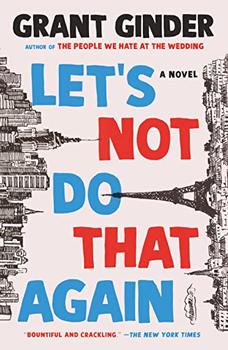Summary | Excerpt | Reading Guide | Reviews | Beyond the book | Read-Alikes | Genres & Themes | Author Bio

A riotously funny, emotionally raw novel about love, marriage, divorce, family, and the ties that bind—whether we like it or not.
The death of Judd Foxman’s father marks the first time that the entire Foxman family—including Judd’s mother, brothers, and sister—have been together in years. Conspicuously absent: Judd’s wife, Jen, whose fourteen-month affair with Judd’s radio-shock-jock boss has recently become painfully public.
Simultaneously mourning the death of his father and the demise of his marriage, Judd joins the rest of the Foxmans as they reluctantly submit to their patriarch’s dying request: to spend the seven days following the funeral together. In the same house. Like a family.
As the week quickly spins out of control, longstanding grudges resurface, secrets are revealed, and old passions reawakened. For Judd, it’s a weeklong attempt to make sense of the mess his life has become while trying in vain not to get sucked into the regressive battles of his madly dysfunctional family. All of which would be hard enough without the bomb Jen dropped the day Judd’s father died: She’s pregnant.
This Is Where I Leave You is Jonathan Tropper's most accomplished work to date, a riotously funny, emotionally raw novel about love, marriage, divorce, family, and the ties that bind—whether we like it or not.
Be warned: you will laugh. You may not always be proud of why you're laughing, but unless you're a paragon of virtue who can resist all urges to indulge in a little schadenfreude, you will laugh. Laughter aside, however, beneath Tropper's wicked sense of humor there is a universal substructure of wisdom that is applicable to all families and blood relationships. Read it and weep… and laugh...continued
Full Review
 (476 words)
(476 words)
(Reviewed by Donna Chavez).
The word "shiva" (pronounced SHIHvah) is derived from the Hebrew word sheva which means "seven." Sitting shiva means that the family of a loved one – usually reserved for the family of a deceased spouse, parent or child – gathers in that loved one's home for seven days. Friends and family visit to support the family as they take time to mourn, and to remember the life of the deceased. While they may not observe the more orthodox practices outlined below, many Jewish families retain the spirit of the tradition in the form of an extended wake, in which friends and family stop by to share memories and grieve together.
Members of the immediate family sit on chairs that are low to the ground – historically they used to sit on ...

If you liked This Is Where I Leave You, try these:

by Grant Ginder
Published 2023
From Grant Ginder, the author of The People We Hate at the Wedding, comes Let's Not Do That Again a poignant, funny, and slyly beguiling novel which proves that, like democracy, family is a messy and fragile thing - perfect for fans of Veep's biting humor, the family drama of Succession, and the joys of Kevin Wilson's Nothing to See Here.

by Jonathan Franzen
Published 2022
Jonathan Franzen's gift for wedding depth and vividness of character with breadth of social vision has never been more dazzlingly evident than in Crossroads.